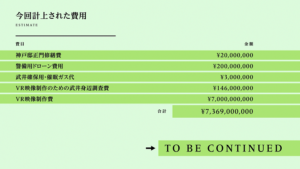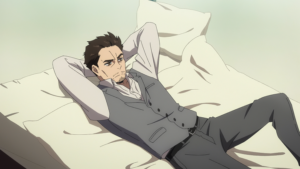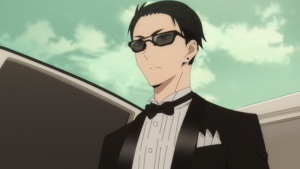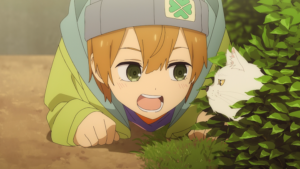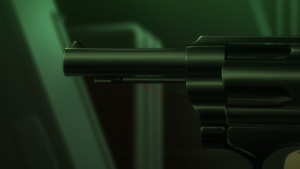Genius, billionaire, playboy, philanthropist. There are a number of rather famous characters that fit this description, from Bruce Wayne to Tony Stark. And it was only a matter of time before anime came back with one of its own in Daisuke Kambe, of Fugou Keiji: Balance: UNLIMITED. Adapted by Studio Cloverworks from a novel series of the same name, originally written by Yasutaka Tsutsui and directed by Tomohiko Itou of Silver Spoon and ERASED fame, Fugou Keiji is a lot of things. It is both a comedy and a mystery. A tale of murder and revenge, of heroics and villainy, and perhaps most importantly: of family. And while there is no shortage of missteps along the way I can say one thing with certainty: Fugou Keiji is a fun show oozing in style and I cannot wait to talk about it with you. So lets jump right in!
(Disclaimer: I am working to make 50 the new “average”. 70 is not an average score people. 70 is above average. Carry on.)
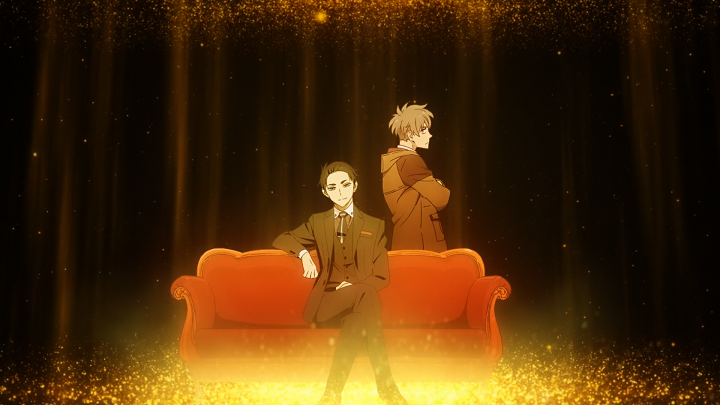
Art/Animation
Starting off as always, lets talk art and animation. Fugou Keiji’s art is easily one of my favorite aspects about its production. Something about the sharp, angular lines yet still realistic proportions lend it a sense of… style. I can’t quite figure out if its the linework, the slight softness to the angles or the characters eyes. Yet something about these designs really pique my interest. Its similar in a way to Haikyuu, though that one is much more brightly colored. Regardless the art and aesthetic of Fugou Keiji is one of the parts I enjoy the most and it lends itself well to the series. When it wants to be comedic, its just low-detail enough to get away with silly expressions. Meanwhile when it needs to be serious it can up the linework/eye detail to draw the viewer in. Add on some special effects and you have Fugou Keiji.
That said, Fugou Keiji is by no means a sakuga-fest. There are good moments no doubt, and they mostly come in the second half as things ramp up. A few fights get special treatment as do some character moments. But its nothing that’s ever particularly impressive. There is no Kimetsu no Yaiba episode 19 or or KyoAni confession scene here. Rather for a large portion of its runtime Fugou Keiji gets by with the bare minimum of animation. Instead relying on the Character Design work of Keigo Sasaki and his team along with the Director of Photography Toshiyuki Aoshima’s work. The best way to put it is that Fugou Keiji has no shortage of good looking stills. The series is well presented and well shot, which we will get into in a moment. But when the r/anime awards come, no one will be thinking of Fugou Keiji for animation.
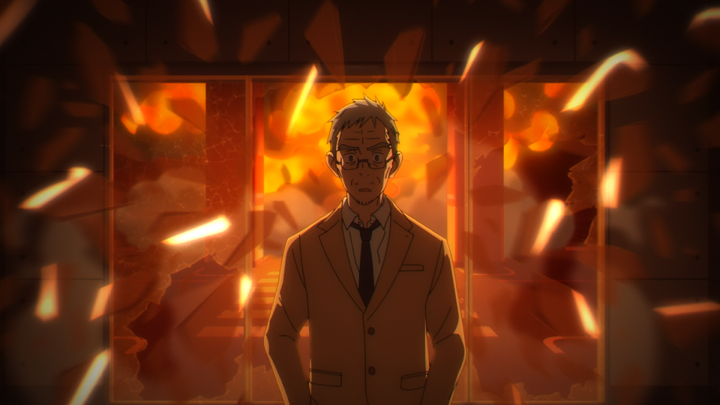
Direction
Next up we come to the Direction, which I believe did most of the heavy lifting carrying Fugou Keiji. Well either that or the characters, but we will get to those. Generally I think Fugou Keiji was shot pretty well. It made good use of its locations and wasn’t afraid to go for some wackier or more “Michael Bay”-esque shots. Some might view that as a negative, but with how little we see it in anime and this basically being a James Bond show, it felt nice. Additionally the Fugou Keiji was rather varied color wise, never afraid to paint the screen in red and oranges, blues and blacks or greens and beige. It changed the color palette of the scene to fit the mood. And while some of those were very “anime” moods that didn’t quite fit at times, I enjoyed it.
There were really only 2 issues I actually had on this front with Fugou Keiji: The lighting and the tonal disparity. For lighting it was very up and down. Some scenes were fantastically lit, playing off the fire or casting shadows well while others were so dark it was almost impossible to see. I understand wanting to set the mood with the darkness, however there comes a point where audience experience takes precedence. As for tone, this goes back to the previously mentioned “wackier” shots. We will get into it more later, but its as if Fugou Keiji couldn’t decide what it wanted to be. A lot of its gags worked because of how the scene was shot and directed. Only for that same style to be brought into more serious scenes or vice versa, negatively impacting the shot.
I can’t say for certain if Fugou Keiji would be better if it had chosen one tone or the other. The comedy is just as much a part of the series as the mystery and neither can really live without the other. In this way it is clear that Fugou Keiji was trying to be something akin to Batman. Where the absurdity of a grown man in a spandex suit dressed as a bat somehow doesn’t take away from the serious drama. Where a man can murder his way through a city dressed as a colorful clown, yet still be one of the most complex and interesting villains in the medium. However unlike Batman, Fugou Keiji doesn’t quite nail this balancing act. It isn’t enough to ruin the show, and most of the time it isn’t a problem at all. But when it does crop up, you definitely notice.
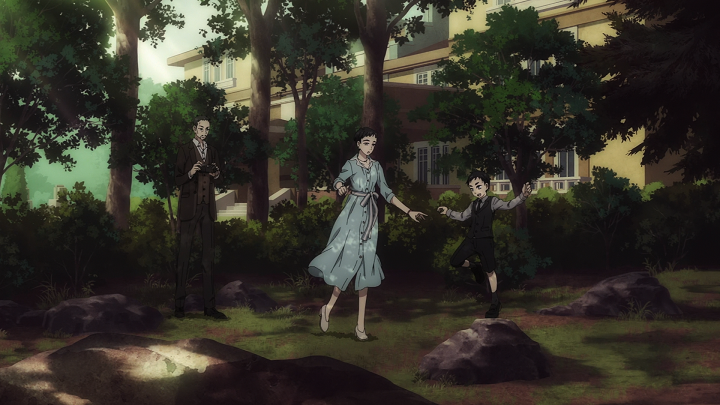
Setting/Story
But what about the story that Fugou Keiji’s art and animation tells, how is that? Had you asked me prior to the finale, I would have answered thus: It is a fun James Bond/Batman romp that can’t figure out what it wants to be. Flip flopping between comedy and crime drama, Fugou Keiji is split between two very different shows. One is a riff on the Tony Starks and Bruce Waynes of media, the super heroes who’s only power is “Money”. In Daisuke Kambe, it gives us a character with all the pride and snark and wealth but absolutely none of the sense of moral responsibility and plays the entire thing like the absurd joke it is. Spending billions of yen to bring in boy bands to placate hostage grannies on a train or buying a building just to blow it and the criminals inside up. Its absurd fun.
The other is a James Bond spy drama with twists and turns, murder and betrayal. Fugou Keiji introduces us to a core murder mystery early on and largely plays it straight. We have corrupt cops, internal politics and an ideological conflict between Kato and Daisuke. One seeking justice through the system and moral means, the other only seeking results regardless of the methods. It’s a very competent, if straight forward, setup. The issue though is that these two shows are taking place in the same timeslot with the same characters, but largely feel independent of each other. The comedy gets in the way of the serious drama. Meanwhile the drama waters down the comedy. Early this is fine, comedy is the focus, and only becomes a problem as we dive deeper and deeper into the core conflict. At least that is what I would have said until the finale.
Let me be clear, the finale is by no means perfect. Fugou Keiji is, at the end of the day, a fun mystery romp that doesn’t take itself very seriously. But the finale, without spoiling it, brought these two disparate shows together. It managed to throw in one last twice, give us one last serious character conflict for our leads and resolve both in such a way that I couldn’t help but laugh along with Daisuke. Fugou Keiji’s story isn’t going to wow you by any means. It might take you by surprise in a few places and it will most definitely disappoint you in a few more, though we will talk about that later. What it will do though is deliver on its initial promise: Entertainment. I was never not entertained by Fugou Keiji and its story. And at the end of the day, what’s more important than that?
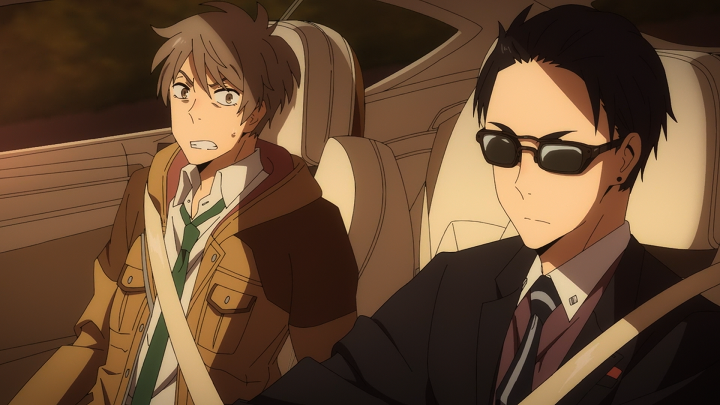
Characters
And now we come to the characters, the core of the show! I’ll just come right out and say that I really enjoyed Fugou Keiji’s characters. Kato and Daisuke bounced off of each other well and though their arcs weren’t perfect, the finale did a lot for them as well. Early on they are portrayed as your usual double act, Kato as the straight man and Daisuke as the funny man. Fugou Keiji has a slight twist on this in that Daisuke is stoic while Kato is the one who overreacts. But Daisuke is also the source of the absurdity 90% of the time. In a way it adds another layer to the dynamic, making it seem even more absurd and comedic when Daisuke takes his own absurdity with complete sincerity. More than once what made the comedy work was Daisuke’s complete and utter non-reaction, and it was great.
As the series progresses, and we start to see the narrative issue mentioned before, the characters shift as well. The comedy is still there but Fugou Keiji starts to show us deeper aspects of who they are. Starts to establish them as actual people rather than comedic stereotypes. We come to see what Daisuke’s home life is like, how pampered and naïve he is when it comes to the real world. Similarly we see Kato’s rigid moral compass and his frugal way of living. The two start to bounce off of and effect each other in meaningful ways, with the comedy just facilitating this exchange. The only real negative I have about the characters is that their arcs seem… underutilized? The next paragraph is going to contain spoilers for their arcs, so please read at your own risk. Otherwise just know that I enjoy them but wish they were more.
Click here to read the spoiler
To put it simply, it felt like the characters were rather static up until the final two episodes. Daisuke never really stops bring a bit of a prick or irresponsible with his money. Kato never really opens up and loosens his strict moral code. There are fantastic episodes that go a long way to help this of course. Episode 4 is just Daisuke and Kato hanging out, Daisuke without his money or AI, and its fantastic. It goes a long way to establishing Daisuke as a real person than a caricature and I thought would set the stage for his slow growth. Sadly though it only really comes as one big rush at the end. For example, Daisuke never really shows his growing respect for Kato, despite the fact that the ending shows us he has it in the ending flashback. It’s not a huge issue, but it is there.
All in all, I quite enjoyed Fugou Keiji’s characters despite the fact that they could’ve been more. It did a great job of easing us into them. Using the early comedy to establish their dynamic and the premise of the show without expecting us to be invested in a serious drama right off the bat. It gave the audience time to get used to and get to know the characters. To come to care for them before the big life-threatening plot. And so when that plot did come around, the audience is already emotionally invested and prepared to care about their actions. The best way to put it I think is that Fugou Keiji slow-rolled us on the feels and it worked out. I will gladly take this over any number of drama shows that expect me to care about my leads dead mother or whatever right out the gate.
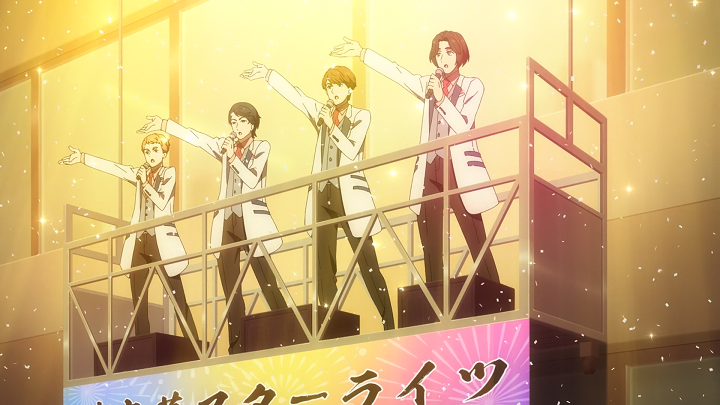
OST/Sound Design
Finally we come to the OST, which I love. Sadly as of writing this, the OST is not officially released. At least not in a way I can get my hands on it. This makes linking to specific songs difficult but I will try my best. The only way I can really describe Fugou Keiji’s OST is fire. My two favorite, and best, examples of this have to be the OP and the ED, the ED being one of my favorites of the year. Between the lyrics, the beat and the slow almost refined sound of the bass I love it. I can’t quite think of the word to describe it, as it isn’t “Jazz” in the slightest. Yet I get a very similar vibe from Fugou Keiji’s OST as I do Jazz music. This style, this distinct and prominent rhythm, etc. And it goes beyond just the bookend songs.
Granted, most of the time Fugou Keiji’s OST felt rather average. Some strings, a basic orchestra in the back, the kind of mood setting music you would expect. It neither really enhanced or took away from whatever scene it was in. Every now and then though you would get something like this: Warning, this contains spoilers for episode 3. You would get some kind of stylish or absurd piece that fit the moment perfectly. It could come in for something silly like this or it could be the perfect song to tie together a dramatic moment. I wish I had an actual OST to link you to, with specific songs to prove my points. I am not nearly musically educated or eloquent enough to make this point. So instead all I can say is this: I have 0 complaints about this OST, and I doubt you will either.
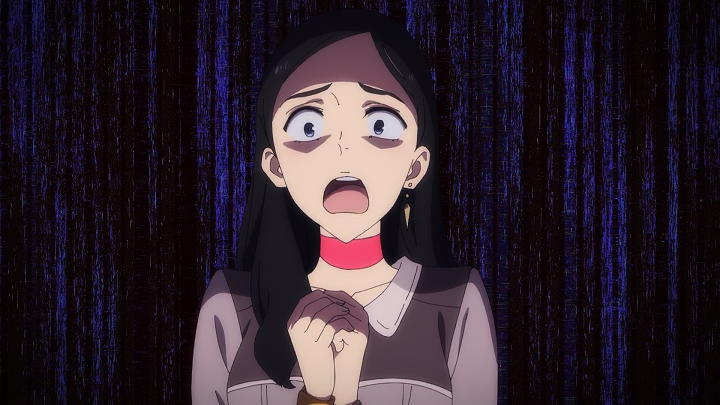
What could have been vs What it was
Now you might be wondering, what the hell is this section of the review and why should I read it? This is basically where I am going to talk about what I wish Fugou Keiji had done differently. Why criticize something without at least trying to be constructive about it, right? This has no bearing on the final score and is entirely my lobbing ideas. My hope is that it will give some perspective to you read above, why I liked some things and not others etc. And fair warning, there will be some serious spoilers in here. Don’t read it if you haven’t already watched Fugou Keiji. Now lets roll!
Click here to read the spoiler
Now in case you haven’t guessed yet, my biggest issue with Fugou Keiji is the tonal inconsistency of it. For a large portion of it’s runtime, Fugou Keiji can’t decide if it wants to be a parody of Tony Stark/Bruce Wayne or an actual detective/mystery thriller. It sort of makes this transition in episode 4, as it leaves behind a lot of the absurdity, but not completely. And I would have preferred it if it had committed more to that switch. Take the AR setup they use to get Takei to basically confess. Not only does this come out of nowhere, but it completely undermines a possible 3 way conflict between Cho, Takei and Daisuke. We could have had an entire arc of them going against each other before they recognize they are on the same side. Instead Fugou Keiji introduces and resolves it in a single episode.
Beyond that Fugou Keiji didn’t use its premise as strongly as it could’ve. Take for instance HEUSC, Daisuke’s AI helper and companion for the show. We learn early on that it cannot be trusted, that someone else is using it and able to shut Daisuke out. And yet Daisuke and Suzue never stop trusting or using HEUSC. There is no conflict there, no distrust, nothing ever happens with that plot point. Fugou Keiji could have had Daisuke take control of HEUSC back, give us another small arc of him without his money/resources and show how he has learned from Kato in doing things the old fashioned way. It also could have been used to let the villain compete with Daisuke on the whole “Balance Unlimited” side of things to. It just feels like HEUSC is underutilized as a plot element, stuck as nothing more than a fancy tool.
None of this is to say that Fugou Keiji is bad, it certainly isn’t. I was never not entertained while watching it, and at the end of the day, that’s the most important thing in my mind. I was always ready for the next episode, even if I ended the episode thinking it could have been more. And credit where its due, Fugou Keiji managed to pull out a fantastic twist at the end that doubled up on the both the character and narrative arcs of the series. Just because I think Fugou Keiji could have been more and used its premise better doesn’t invalidate the work it did put in and what it did accomplish.
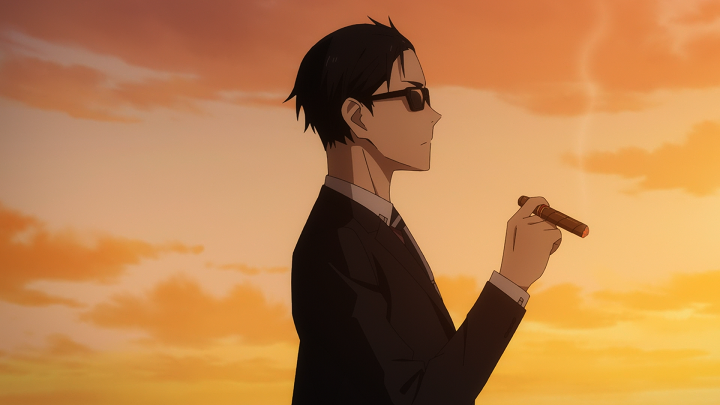
Conclusion
So all in all, at the end of the day, how was Fugou Keiji: Balance: Unlimited? Well for all of its faults, despite the fact that I think it could have been a 10/10, that doesn’t undo what it did accomplish. I was never not entertained by Fugou Keiji, I was always looking forward to the next episode. And while I might end those episodes thinking they could have been more, at the end of the day, I think its the entertainment that matters. Not every show has to reach for the stars and make some grand philosophical argument. Its nice when it happens, but there is nothing wrong with some popcorn crime drama. And Fugou Keiji delivers on that popcorn crime drama and then some.
Thanks for reading. If you want to leave a comment you can do it at here or on my twitter here. I always love feedback and I will see you next season!

